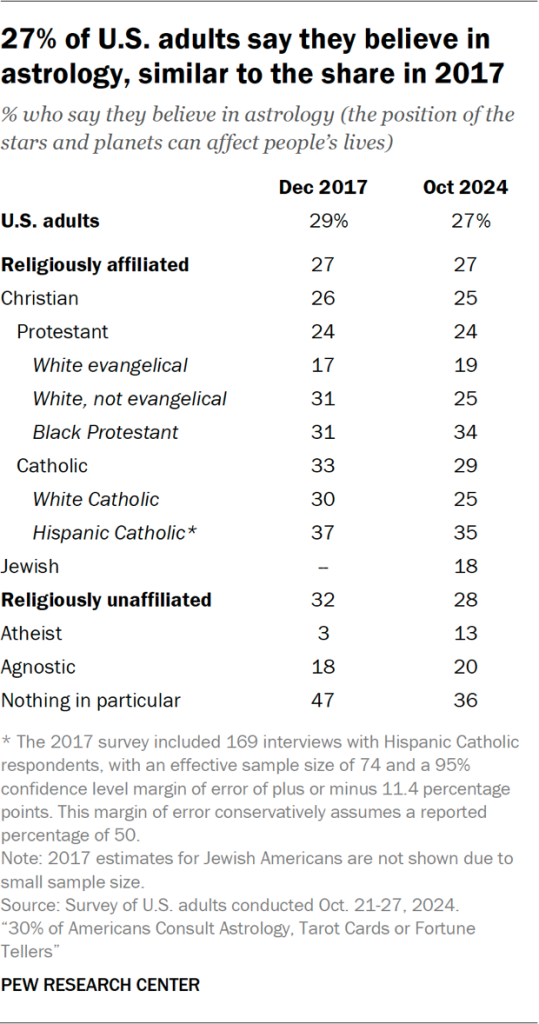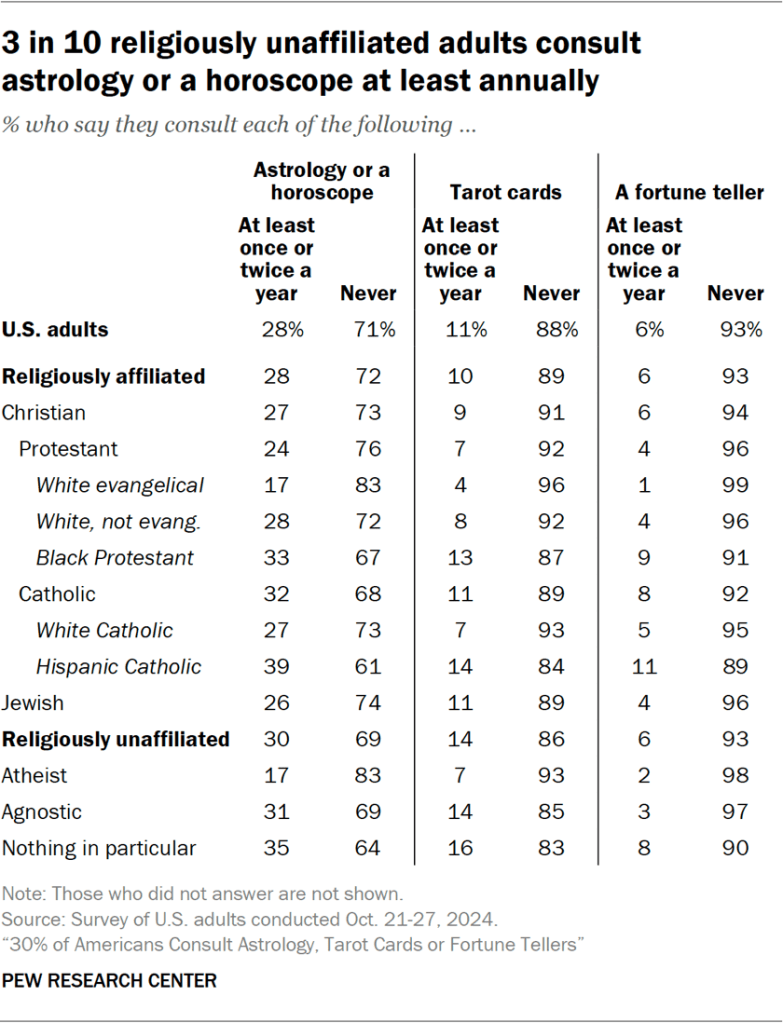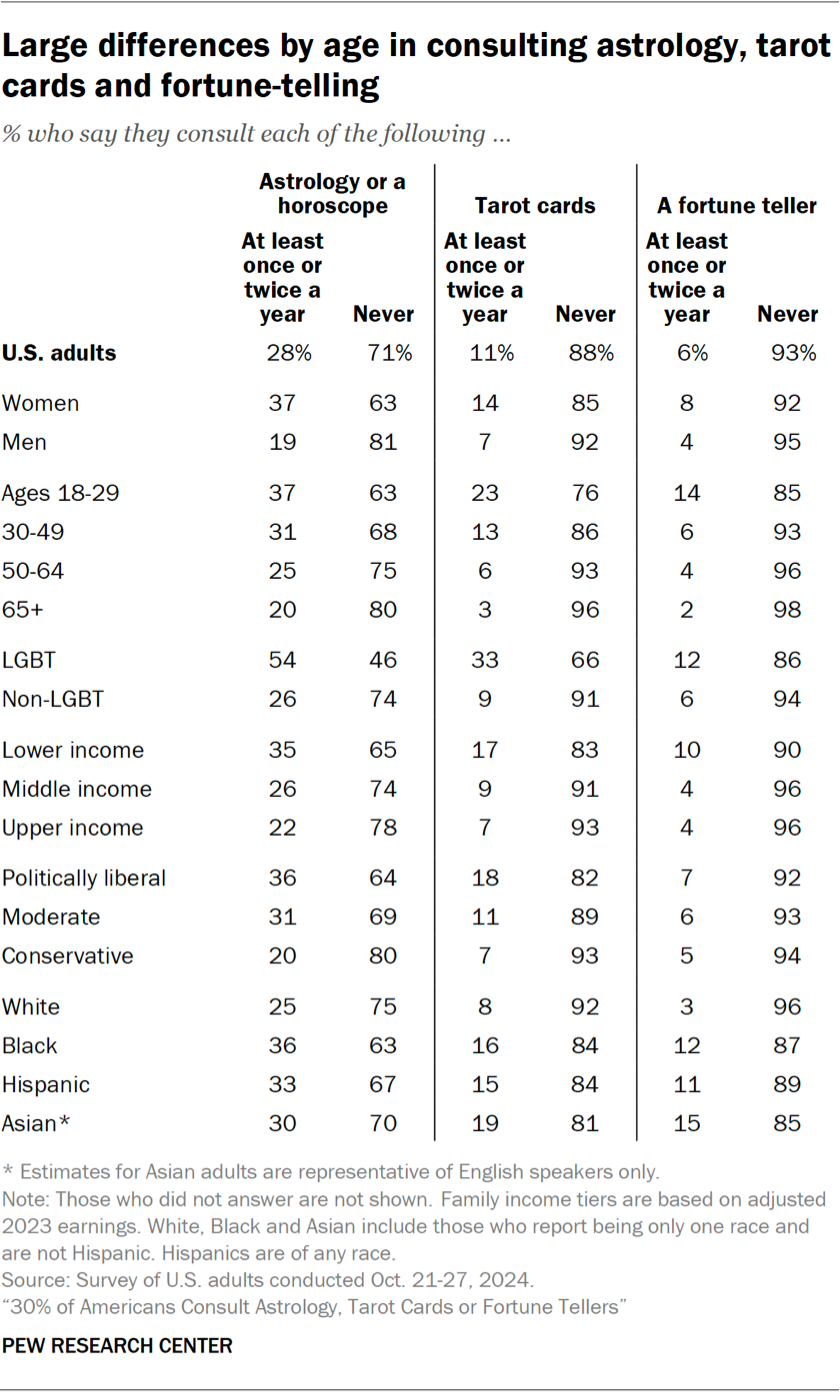Belief in astrologyReligiously affiliated Americans and religiously unaffiliated Americans are equally likely to believe in astrology (27% and 28%, respectively). (Religiously unaffiliated Americans are those who identify religiously as atheist, agnostic or “nothing in particular.”)  But some religious groups are especially likely to believe that the position of stars and planets can affect people’s lives. About one-third or more of Black Protestants, Hispanic Catholics and adults who say their religion is “nothing in particular” say they believe in astrology. On the other hand, atheists, agnostics, White evangelical Protestants and Jewish Americans are less likely than the general public to say they believe in astrology. The survey included respondents of many other religious backgrounds, including members of the Church of Jesus Christ of Latter-day Saints (widely known as Mormons), Muslims, Hindus and Buddhists. But there are not enough respondents from these smaller groups to report on their answers separately. Views among demographic subgroupsMore advanced statistical analyses show that belief in astrology also varies significantly across demographic categories. We ran regression analyses to examine the independent effects of a number of factors – including gender, age, race, educational attainment, political party, ideology, income level, region, and LGBT identity – on belief in astrology while holding all else equal.  In addition to differences by religion, there are sizable gaps across the following demographic categories:
Belief in astrology among these demographic subgroups has changed little since we asked this question in 2017. A slight decline among political conservatives (4 percentage points) is the only difference that is statistically significant. Consulting astrology or horoscopes, tarot cards, and fortune tellersThe share of Americans who say they consult astrology or a horoscope at least once or twice a year (28%) parallels the share who say they believe in astrology (27%).  Hispanic Catholics (39%), Black Protestants (33%) and adults who say their religion is “nothing in particular” (35%) are among the most likely to say they consult astrology at least annually. About one-in-ten Americans consult tarot cards at least annually. On the whole, religiously unaffiliated Americans are slightly more likely than religiously affiliated Americans to say they consult tarot cards at least yearly (14% vs. 10%). But this is primarily due to the use of tarot cards by agnostics and people who say their religion is “nothing in particular,” rather than by atheists. Religious differences in consulting a fortune teller are not very pronounced. When asked about consulting astrology or a horoscope, tarot cards, or fortune tellers, White evangelicals and atheists are among the groups that are most likely to say they never engage in the practices. Views among demographic subgroupsAbout half of LGBT adults (54%) say they consult astrology or a horoscope at least annually.  Also, 37% of women say they do this at least once a year – a figure that rises to 46% among women ages 18 to 49. Americans in lower-income households are more likely than those in upper-income households to say they consult astrology annually – as are those who describe themselves as politically liberal, compared with self-identified conservatives. While religious groups in this analysis generally don’t differ much in their propensity to consult tarot cards, there are relatively large differences by LGBT identity, gender and age. LGBT adults are about three times as likely as non-LGBT adults to report consulting tarot cards at least annually (33% vs. 9%). And 15% of LGBT adults say they consult tarot cards at least once or twice a month. (Refer to the detailed tables for more information about how often people in different demographic groups say they engage in these practices.) Nearly a quarter of Americans ages 18 to 29 say they consult tarot cards at least annually, compared with just 6% of Americans ages 50 to 64 and 3% of Americans who are 65 and older. There are also differences by gender, income level and political ideology, though no more than about a third of adults in any demographic group we have analyzed say they consult tarot cards at least yearly. Consulting a fortune teller is also relatively rare among all the groups in this analysis, though there are some notable differences by age, and by race and ethnicity. For example, 14% of U.S. adults under 30 say they consult a fortune teller, compared with 2% of those ages 65 and older. And 15% of Asian Americans say they consult a fortune teller at least yearly, compared with 3% of White Americans. Overall, 6% of U.S. adults consult a fortune teller at least once or twice a year. Engaging in these practices for fun versus for insightA majority of U.S. adults who engage in at least one of these three practices say they do so mostly “just for fun,” rather than because they “believe the practices give them helpful insights.” That said, Hispanic Catholics, Black Protestants and adults who say their religion is “nothing in particular” are among the most likely to say they believe that consulting a fortune teller, tarot cards or astrology gives them helpful insights. |
